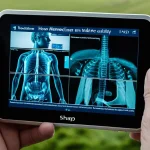Key Technological Advancements Shaping UK Healthcare
Digital health technologies have dramatically transformed the landscape of UK healthcare innovation. The NHS technology integration has accelerated, enabling improved access and efficiency in patient care. Among the major recent innovations are telemedicine, AI diagnostics, and wearable health devices, all contributing to more personalized and timely interventions.
Telemedicine, for instance, allows virtual GP appointments, reducing waiting times and enriching patient convenience. AI diagnostics are increasingly used in radiology to enhance accuracy and speed in identifying conditions, demonstrating clear benefits in early detection and treatment planning. Wearable health devices, integrated within NHS technology integration efforts, enable continuous remote patient monitoring, facilitating proactive management of chronic diseases.
Have you seen this : What Innovations Are Transforming UK Healthcare Today?
These technologies are being implemented across NHS trusts and private providers, reflecting a broad commitment to modernization. For example, remote patient monitoring has shown promise in managing heart conditions and diabetes, improving patient outcomes while reducing hospital admissions. The integration of digital health technologies continues to evolve, driving the UK healthcare system toward a more connected and efficient future.
Impact of Digital Transformation on Patient Care and Outcomes
Digital transformation significantly drives patient care improvement by making healthcare more accessible and efficient. In the UK, healthcare outcomes have been positively influenced by the use of online consultations and remote monitoring tools, allowing patients to receive support without the need for physical appointments. This reduces wait times and increases convenience, especially for those in rural or underserved areas.
This might interest you : How Are Advancements in UK Health Technology Shaping the Future of Patient Care?
Additionally, diagnostic accuracy has improved thanks to advanced imaging and AI-powered analysis, which speeds up treatment decisions. Personalised medicine tailors treatments based on individual patient data, enhancing effectiveness and reducing side effects. These digital healthcare benefits contribute directly to better patient outcomes.
Surveys show that patients report higher satisfaction levels due to easier communication with clinicians and more involvement in their own care. Case studies highlight real-world examples where digital tools have reduced hospital admissions and improved chronic disease management. Collectively, these changes underscore how digital transformation enriches the quality and safety of healthcare delivery in the UK.
Challenges and Barriers to Technology Adoption in the NHS
Adopting new technology within the NHS faces significant funding constraints and marked disparities in digital infrastructure. Many NHS trusts struggle to invest adequately in up-to-date hardware and software, which hampers the consistent implementation of digital tools. These infrastructure gaps complicate efforts to standardize systems across facilities.
Another key barrier is staff training and digital literacy. NHS teams often confront steep learning curves with new technology, fostering resistance to change. Without sufficient training programs, employees may feel overwhelmed, leading to underutilization of digital resources. Overcoming this requires targeted education and ongoing support to build confidence and competence.
Data security remains a paramount concern, given the sensitive nature of patient information. Compliance with UK regulations like GDPR demands robust protection measures. Balancing rapid digital adoption with thorough privacy safeguards is complex but necessary. When executed properly, rigorous data governance instills trust among patients and professionals alike, paving the way for fuller digital adoption.
These NHS technology challenges highlight that successful implementation depends on both financial investment and cultural shift within healthcare settings.
Expert Insights and Current Statistics on Technology in UK Healthcare
The healthcare statistics UK reveal a significant surge in digital adoption within the NHS. Recent data show that the NHS digital adoption rate has surpassed 70% for electronic health records (EHR), reflecting a strong commitment to modernization. Telemedicine usage has doubled in the past three years, with over 25 million virtual consultations conducted annually, accelerating patient access to care.
Health tech experts highlight the vital role of artificial intelligence (AI) in diagnostics and patient management. AI deployment in NHS pilot programmes has improved early detection rates of conditions such as cancer and cardiac diseases by approximately 15%. Experts emphasize that while these advancements represent a remarkable leap, continued investment and training are essential to fully realize technology’s potential.
NHS leaders and policy makers advocate for sustained integration of digital solutions, citing benefits like reduced waiting times and enhanced data accuracy. Ongoing pilot programmes focus on remote monitoring and AI-supported decision tools, aiming to refine patient outcomes and streamline workflows. These combined efforts position the UK at the forefront of healthcare transformation through technology.
Future Trends and the Evolving Landscape of Healthcare Technology in the UK
The future healthcare UK landscape is rapidly transforming thanks to emerging technologies such as genomics, blockchain, and advanced data analytics. These innovations promise to enhance diagnostic accuracy, personalize treatments, and improve the security and interoperability of sensitive patient data. For instance, genomics enables tailored therapies directly targeting genetic profiles, boosting effectiveness and reducing side effects.
The NHS digital strategy plays a crucial role in integrating these technologies. Its roadmap through 2025 outlines ambitious goals to expand digital health tools, improve equity of access, and streamline service delivery. Blockchain’s decentralized data management is set to reinforce patient trust by ensuring transparency and security in health records.
Advanced data analytics allow real-time insights from vast datasets, supporting timely decision-making and proactive care. Together, these trends will not only improve patient outcomes but also support healthcare professionals by reducing administrative burdens and enabling more precise interventions.
Understanding these health tech trends equips NHS stakeholders to harness innovation responsibly, creating a sustainable and inclusive future healthcare system across the UK.



